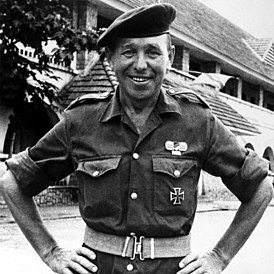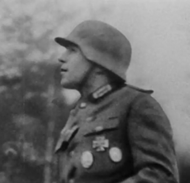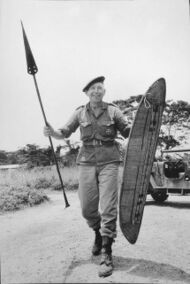Fritz Koehne (Pacifica)
Fritz Sebastian Koehne | |
|---|---|
 | |
| Born | 17 August 1922 Wuppertal, Weissersteiner Empire |
| Died | 22 December 1999 (aged 77) Karlsdorf, Weissersteiner Empire |
| Allegiance | |
| Rank | Major |
| Battles/wars | Weissersteiner Civil War Sallodesian Bush War Pelinese Civil War Cimbrian Civil War Second Elbonian Crisis |
| Spouse(s) | Lara Koehne (née Steinhauser) |
| Children | Robert Koehne Mekongo Siba (adopted) |
"Many see my adopted father as a warmonger, a dishonourable merc or scum. However, I can attest that behind the facade of war, Koehne was a deeply caring man with an enormous heart. A man just like any other."—Gen. Mekongo Siba during a Sallodesian interview about his adopted father.
Fritz Sebastian Koehne (17 August 1922 – 22 December 1999) was a Weissersteiner soldier, military advisor, paramilitary trainer, and foreign fighter who fought in multiple wars abroad. He was influential in establishing several paramilitary groups abroad (namely the Kybok Dragoons and the Pelinese Volunteer Legion). This inadvertently made him an important and influential military figure in Weisserstein during the Cold War. He also adopted Sallodesian General Mekongo Siba during his time with the Kybok Dragoons in the Sallodesian Bush War.
Early life
Koehne was born in Crossen an der Salzach, Weisserstein, in 1922. His father served in the Weissersteiner Reichswehr's 7th Army during the War of 1919. This would affect Koehne in his interest with military-related topics. At the age of eight he enrolled to a boarding school in Lindenburg and then commenced training for accountancy. He also joined the Landwehr, the reserve component of the Weissersteiner Reichswehr. In 1928, his sister, Marja, was born. It was also around this time he met Friedrich Josef von Lettow-Ermhau, who would later become one of the main patrons of the formation of the United Crabryan Duchy.
Weissersteiner Civil War
Siege of Wuppertal
On the evening of 2 July, Straßrist forces would occupy the small village of Unterstadt, 7 km from Wuppertal. By 3 July, Strasserist forces began engaging the Reichswehr in the western districts. This would be followed by a communist attack on the eastern districts of the city, effectively encircling Wuppertal from all sides except the north.
Maria would be killed during a firefight between the Reichswehr and communist forces on 12 November, which was witnessed by Fritz. This was said to have caused Koehne to fall into a deep state of depression, which, according to his father, eventually morphed into hatred for fascists, communists, and other enemies of the state.
Fritz would join the local Volkswehr during this period, which was a local self-defense force made by the city's inhabitants. The unit was eventually absorbed into the Reichswehr following the liberation of the city in 1944. He was promoted to a lieutenant following the liberation of the towns of Unterstadt and Lichtfurt am Rhein, which he played a key role in. For his service throughout the conflict, he would receive an Iron Cross, second class, which would become an iconic trademark of his throughout the Cold War.
Lindenau, Kurzweise, and Rotterstadt
Koehne would partake in the third battle of Lindenau, which would end in a decisive Imperial victory and prove to be a major blow for the communist forces, as Lindenau was the last major city on their grip. The fall of Lindenau saw the capture of the leadership of the Weissersteiner Soviet Republic, namely the state president of the republic and general-secretary of the KPW Karl Liebknecht.
He would also partake in the liberation of Kurzweise and Rotterstadt in May 1945, both of which were major Strasserist strongholds in Lowenia. The offensive was considered key in securing Imperial victory in Lowenia, and eventually the entirety of Weisserstein.

Battle of Brandenburg
Following the fall of Kurzeise and Rotterstadt, Strasserist forces found themselves surrounded in Brandenburg. The leadership of the Strasserist party, namely Georg Strasser and Martin Heusmann.
Cold War activities and the Black Reichswehr
Sallodesian Bush War
